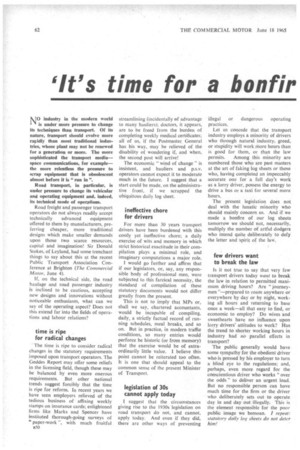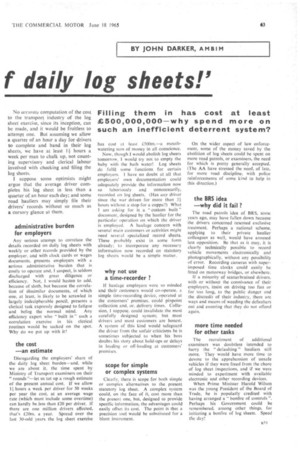'It's time for a bon fir f daily log sheets!'
Page 64

Page 65

If you've noticed an error in this article please click here to report it so we can fix it.
BY JOHN DARKER, AMBM
Filling them in has cost at least Z500,000,000—why spend more on such an inefficient deterrent system?
NO industry in the modern world is under more pressure to change its techniques than transport. Of its nature, transport should evolve more rapidly than most traditional industries, whose plant may not be renewed for a generation or more. The more sophisticated the transport media— space communications, for example— the more relentless the pressure to scrap equipment that is obsolescent almost before it is "run in ".
Road transport, in particular, is under pressure to change its vehicular and operating equipment and, indeed, its technical mode of operations.
Road freight and passenger transport operators do not always readily accept technically advanced equipment offered to them by manufacturers, preferring cheaper, more traditional designs which make smaller demands upon those two scarce resources, capital and imagination! Sir Donald Stokes, of Leyland, had some trenchant things to say about this at the recent Public Transport Association Conference at Brighton (The Commercial Motor, June 4).
If, on the technical side, the road haulage and road passenger industry is inclined to be cautious, accepting new designs and innovations without noticeable enthusiasm, what can we say of the operating aspect? Does not this extend far into the fields of operations and labour relations?
time is ripe for radical changes
The time is ripe to consider radical changes in the statutory requirements imposed upon transport operators. The Geddes Report may offer some reliefs in the licensing field, though these may be balanced by even more onerous requirements. But other national trends suggest forcibly that the time is ripe for reform. In recent years we have seen employers relieved of the tedious business of affixing weekly stamps on insurance cards; enlightened firms like Marks and Spencer have instituted thorough-going surveys of "paper-work ", with much fruitful a30 streamlining (incidentally of advantage to many hauliers); doctors, it appears, are to be freed from the burden of completing weekly medical certificates; all of us, if the Postmaster General has his way, may be relieved of the disability of wondering if, and when, the second post will arrive!
The economic "wind of change" is insistent, and hauliers and p.s.v. operators cannot expect it to moderate much in the future. I suggest that a start could be made, on the administrative front, if we scrapped the ubiquitous daily log sheet.
ineffective chore for drivers
For more than 30 years transport drivers have been burdened with this costly yet ineffective chore; a daily exercise of wits and memory in which Strict historical exactitude in their compilation plays a minimal role, and imaginary computations a major role.
I would go further and affirm that if our legislators, or, say, any responsible body of professional men, were subjected to this farcical necessity, the standard of compilation of these statutory documents would not differ greatly from the present.
This is not to imply that MPs or, shall we say, chartered accountants, would be incapable of compiling, daily, a strictly factual record of running schedules, meal breaks, and so on. But in practice, in modem traffic conditions, so many entries would perforce be historic (or from memory) that the exercise would be of extraordinarily little value. I believe this point cannot be reiterated too often. It is one that should appeal to the common sense of the present Minister of Transport.
legislation of 30s cannot apply today
I suggest that the circumstances giving rise to the 1930s legislation on road transport do not, and cannot, apply today. And even if they did, there are other ways of preventing illegal or dangerous operating practices.
Let us concede that the transport industry employs a minority of drivers who through natural industry, greed, or stupidity will work more hours than is good for them, or than the law permits. Among this minority are numbered those who are past masters at the art of faking log sheets or those who, having completed an impeccably accurate one for a full day's work as a lorry driver, possess the energy to drive a bus or a taxi for several more hours.
The present legislation does not deal with the lunatic minority who should mainly concern us. And if we made a bonfire of our log sheets tomorrow we should not, necessarily, multiply the number of artful dodgers who intend quite deliberately to defy the letter and spirit of the law.
few drivers want to break the law
Is it not true to say that very few transport drivers today want to break the law in relation to permitted maximum driving hours? Are "journeymen "—prepared to roam anywhere or everywhere by day or by night, working all hours and returning to base once a week—all that easy to find, or economic to employ? Do wives and sweethearts have no influence upon lorry drivers' attitudes to work? Has the trend to shorter working hours in industry had no parallel effects in transport?
The public generally would have some sympathy for the obedient driver who is pressed by his employer to turn a blind eye to the regulations; and, perhaps, even more regard for the conscientious driver who works "over the odds" to deliver an urgent load. But no responsible person can have much time for the firm or the driver who deliberately sets out to operate day in and day out illegally. This is the element responsible for the poor public image we bemoan. l repeat: statutory daily log sheets do not deter him!
No accurate computation of the cost to the transport industry of the log sheet exercise, since its inception, can be made, and it would be fruitless to attempt one. But assuming we allow a quarter of an hour a day for drivers to complete and hand. in their log sheets, we have at least 1+ hours a week per man to chalk up, not counting supervisory and clerical labour involved with checking and 'filing the log sheets.
I suppose some optimists might argue that the average driver completes his log sheet in less than a
quarter of an hour each day; and some road hauliers may simply file their drivers' records without so much as a cursory glance at them.
administrative burden for employers Any serious attempt to correlate the details recorded on daily log sheets with weekly or other records provided by the employer, and with clock cards or wages documents, presents employers with a serious administrative burden that is costly to operate and, I suspect, is seldom discharged with great diligence or efficiency. Not, I would hasten to add, because of sloth, but because the correlation of dissimilar documents, of which one, at least, is likely to be scrawled in largely indecipherable pencil, presents a clerical task expressly designed to fatigue and befog the normal mind. Any efficiency expert who " built in" such a correlation exercise in his clerical routines would be sacked on the spot. Why do we put up with it?
the cost —an estimate
Disregarding the employers' share of the daily log sheet burden—and, while we are about it, the time spent by Ministry of Transport examiners on their " rounds "—let us tot up a rough estimate of the present annual cost. If we allow 11 hours a week per driver for 50 weeks per year the cost, at an average wage rate (which must include some overtime) can hardly be less than £20 per driver. If there are one million drivers affected, that's £20m, a year. Spread over the last 30-odd years the log sheet exercise has cost at least. £500m.—a mouthwatering sum of money in all conscience.
Now, though I would abolish log sheets tomorrow. I would try not to empty the baby with the bath water! Log sheets do fulfil some functions for certain employers. I have no doubt at all that employers' own documentation could adequately provide the information now so laboriously and unnecessarily, recorded on log sheets. (Has arty driver since the war driven for more than 54 hours without a stop for a cuppa?) What
am asking for is a custom built " document, designed by the haulier for the particular operation on which the driver is employed. A haulage concern with several main customers or activities might need several specialized record sheets. These probably exist in some form already; to incorporate any necessary information now recorded on statutory log sheets would be a simple matter.
why not use
a time-recorder ?
If haulage employers were so minded and their customers would co-operate, a simple time-recording device, operated at the customers' premises, could pinpoint collection and, or. delivery times. Collusion, I suppose, could invalidate the most carefully designed system; but most drivers and most customers are honest. A system of this kind would safeguard the driver from the unfair criticisms he is sometimes subjected to when his boss doubts his story about hold-ups or delays in loading or off-loading at customers' premises.
scope for simple or complex systems
Clearly, there is scope for both simple or complex alternatives to the present statutory log sheet. A complex system could, on the face of it, cost more than the present one, but, designed to provide specific information, the advantages could easily offset its cost. The point is that a precision tool would be substituted for a blunt instrument. On the wider aspect of law enforcement, some of the money saved by the abolition of log sheets could be spent on more road patrols, or examiners, the need for which is pretty generally accepted. (The AA have stressed the need, of late, for more road discipline, with police reinforcements of some kind to help in this direction.)
the BRS idea —why did it Fail?
The road patrols idea of BRS, some years ago, may have fallen down because the drivers concerned resented exclusive treatment. Perhaps a national scheme, applying to their private haulier colleagues as well, would have aroused less opposition. Be that as it may, it is clearly technically possible to record vehicle movements electronically and photographically, without any possibility of error. Recording cameras with superimposed time clocks could easily be fitted on motorway bridges, or elsewhere.
If a minority of scatterbrained drivers, with or without the connivance of their employers, insist on driving too fast or for too long, to the public danger and the discredit of their industry, there are ways and means of weeding the defaulters out and ensuring that they do not offend again.
more time needed for other tasks
The recruitment of additional examiners was doubtless intended to harry the " defaulting " hauliers still more. They would have more time to devote to the apprehension of unsafe vehicles if they were freed from the chore of log sheet inspections, and if we were minded to experiment with available electronic and other recording devices.
When Prime Minister Harold Wilson was the young President of the Board of Trade, he is popularly credited with having arranged a bonfire of controls ". Perhaps his Government could be remembered, among other things, for initiating a bonfire of log sheets. Speed the day!




































































































































